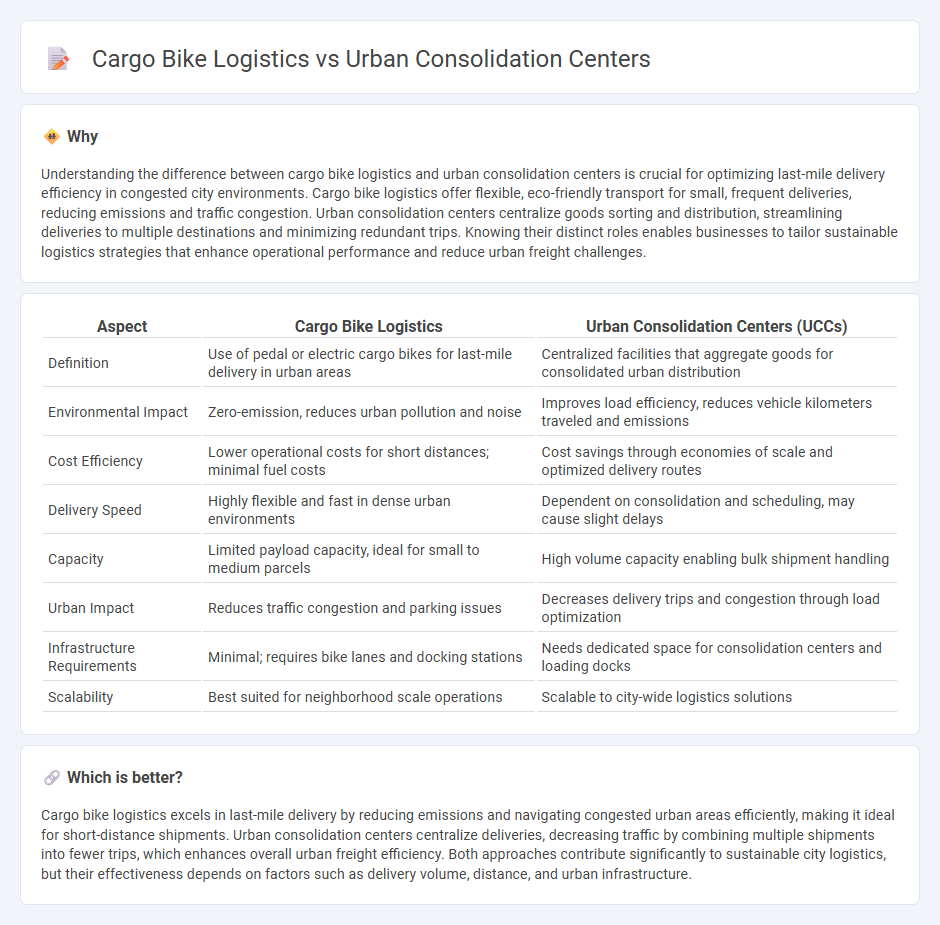
Cargo bike logistics offers eco-friendly last-mile delivery solutions, reducing traffic congestion and carbon emissions in dense urban areas. Urban consolidation centers streamline freight by centralizing deliveries, enhancing efficiency, and cutting transportation costs for multiple retailers. Explore how combining cargo bike logistics with urban consolidation centers can revolutionize sustainable urban freight management.
Why it is important
Understanding the difference between cargo bike logistics and urban consolidation centers is crucial for optimizing last-mile delivery efficiency in congested city environments. Cargo bike logistics offer flexible, eco-friendly transport for small, frequent deliveries, reducing emissions and traffic congestion. Urban consolidation centers centralize goods sorting and distribution, streamlining deliveries to multiple destinations and minimizing redundant trips. Knowing their distinct roles enables businesses to tailor sustainable logistics strategies that enhance operational performance and reduce urban freight challenges.
Comparison Table
| Aspect | Cargo Bike Logistics | Urban Consolidation Centers (UCCs) |
|---|---|---|
| Definition | Use of pedal or electric cargo bikes for last-mile delivery in urban areas | Centralized facilities that aggregate goods for consolidated urban distribution |
| Environmental Impact | Zero-emission, reduces urban pollution and noise | Improves load efficiency, reduces vehicle kilometers traveled and emissions |
| Cost Efficiency | Lower operational costs for short distances; minimal fuel costs | Cost savings through economies of scale and optimized delivery routes |
| Delivery Speed | Highly flexible and fast in dense urban environments | Dependent on consolidation and scheduling, may cause slight delays |
| Capacity | Limited payload capacity, ideal for small to medium parcels | High volume capacity enabling bulk shipment handling |
| Urban Impact | Reduces traffic congestion and parking issues | Decreases delivery trips and congestion through load optimization |
| Infrastructure Requirements | Minimal; requires bike lanes and docking stations | Needs dedicated space for consolidation centers and loading docks |
| Scalability | Best suited for neighborhood scale operations | Scalable to city-wide logistics solutions |
Which is better?
Cargo bike logistics excels in last-mile delivery by reducing emissions and navigating congested urban areas efficiently, making it ideal for short-distance shipments. Urban consolidation centers centralize deliveries, decreasing traffic by combining multiple shipments into fewer trips, which enhances overall urban freight efficiency. Both approaches contribute significantly to sustainable city logistics, but their effectiveness depends on factors such as delivery volume, distance, and urban infrastructure.
Connection
Cargo bike logistics integrate seamlessly with urban consolidation centers by enabling efficient last-mile delivery in congested city areas. Urban consolidation centers serve as centralized hubs where goods are received, sorted, and then dispatched via eco-friendly cargo bikes, reducing traffic and emissions. This synergy enhances delivery speed, lowers costs, and promotes sustainable urban freight distribution.
Key Terms
Last-mile delivery
Urban consolidation centers optimize last-mile delivery by centralizing goods storage and reducing multiple delivery trips, thereby decreasing congestion and emissions in city centers. Cargo bike logistics offer a sustainable solution for navigating narrow urban streets with faster, more flexible parcel delivery, especially in dense and environmentally sensitive areas. Discover how integrating these approaches enhances efficient and eco-friendly urban logistics.
Urban congestion
Urban consolidation centers (UCCs) reduce congestion by centralizing freight deliveries, minimizing the number of delivery vehicles in city centers and streamlining last-mile logistics. Cargo bike logistics tackle urban congestion by using small, agile bikes that navigate traffic efficiently and require less parking space, significantly lowering carbon emissions compared to traditional vans. Explore how integrating UCCs and cargo bike solutions can synergistically alleviate urban traffic challenges and enhance sustainable city logistics.
Emissions reduction
Urban consolidation centers (UCCs) centralize freight deliveries to reduce vehicle trips, significantly cutting emissions in dense city areas by optimizing load capacity and delivery routes. Cargo bike logistics further decrease carbon footprints by replacing motorized vehicles with zero-emission bikes, especially effective for last-mile deliveries in congested urban centers. Explore how integrating these innovative solutions can accelerate sustainable urban freight and enhance emission reduction strategies.
Source and External Links
Advancing City Logistics and Sustainability with Urban Consolidation Centers - Urban Consolidation Centers (UCCs) are warehouses located near urban areas that consolidate deliveries from multiple vendors onto fewer trucks, reducing vehicle trips by 60-80%, easing congestion, enabling off-peak deliveries, and supporting sustainability goals by reducing emissions.
Urban consolidation centers - a solution for improved and sustainable city logistics - UCCs sort and consolidate goods delivered from various locations before last-mile delivery within cities on smaller vehicles like vans or cargo bikes, helping reduce traffic and emissions but requiring significant cooperation among stakeholders and infrastructure investment.
Urban Consolidation Centers: The Good, The Bad, and the Ugly-The Dutch Experience - In The Netherlands, UCCs have been implemented as part of public-private partnerships with stakeholder collaboration and government support, demonstrating UCCs' potential to improve urban freight transport efficiency and environmental friendliness through shared delivery systems.
 dowidth.com
dowidth.com